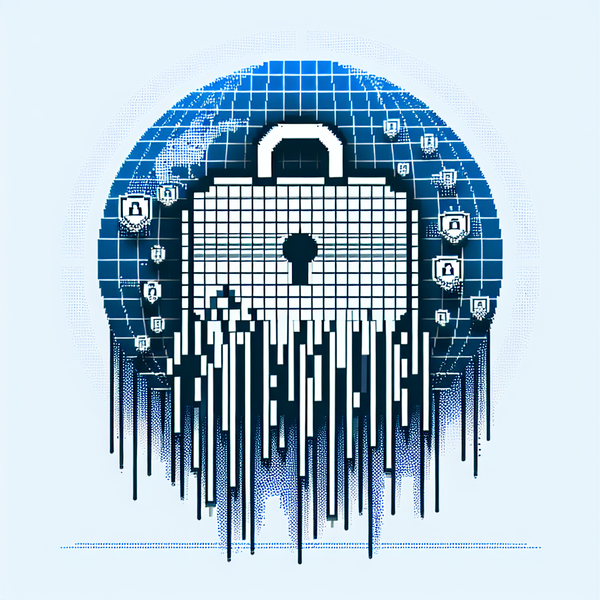Secret CISO 9/3: UK MoD Leak, Palo Alto Breach, WhatsApp Spyware, Jaguar Land Rover Cyber Incident, YouTubers Bust Chinese Scam

Welcome to today's edition of Secret CISO, where we unravel the intricate web of cybersecurity challenges and triumphs shaping our digital world. Today's stories weave a narrative of vulnerability and resilience, as we explore the far-reaching consequences of data breaches, the relentless pursuit of cybercriminals, and the innovative defenses being deployed to safeguard our digital lives.
We begin with the UK Ministry of Defence's Afghan data leak, a costly blunder that not only endangers lives but also questions the government's data management capabilities. Meanwhile, major cybersecurity firms like Palo Alto Networks, Zscaler, and Cloudflare grapple with a third-party breach that exposes the fragility of OAuth tokens and third-party integrations.
In a parallel tale of vulnerability, Jaguar Land Rover faces operational disruption due to a cyber incident, underscoring the critical need for robust defenses in industrial sectors. On the consumer front, WhatsApp swiftly patches a zero-click spyware bug targeting Apple users, highlighting the ongoing battle to protect user privacy.
As we delve deeper, we uncover the alarming exploitation of Salesloft's breach, which ripples through cloud ecosystems, and the emergence of MystRodX, a stealthy backdoor that challenges conventional security measures. The narrative takes a hopeful turn as YouTubers collaborate with law enforcement to dismantle a massive Chinese scam ring, showcasing the power of digital communities in combating cybercrime.
Finally, we spotlight a series of vulnerabilities, from Oxford Instruments' remote code execution flaw to WordPress' SQL injection risk, each a reminder of the ever-present need for vigilance and timely updates. Join us as we navigate these complex stories, offering insights and strategies to fortify your defenses in an increasingly interconnected world.
Data Breaches
- The Full Cost of the Ministry of Defence Afghan Data Leak: The UK Ministry of Defence's data leak has put thousands of Afghans at risk and is expected to cost taxpayers hundreds of millions. The breach has raised significant concerns about the government's ability to manage sensitive data and the financial implications of relocating affected individuals. Source: Byline Times
- Palo Alto Networks, Zscaler, Cloudflare Hit by Latest Data Breach: A third-party breach has impacted customers of major cybersecurity firms like Palo Alto Networks, Zscaler, and Cloudflare. The breach involved the theft of OAuth tokens, which were used to access sensitive customer data, highlighting vulnerabilities in third-party integrations. Source: CSO Online
- Stolen OAuth Tokens Expose Palo Alto Customer Data: Hackers accessed Palo Alto Networks' Salesforce instance using credentials stolen from Salesloft's Drift platform. This breach has raised concerns about the security of cloud-based customer management systems and the potential for widespread data exposure. Source: The Register
- Hackers Exploit Salesloft Breach to Steal Cloud Data: A security breach at Salesloft exposed data from thousands of companies, leading to fears of potential cyberattacks and credential theft. This incident underscores the risks associated with supply chain vulnerabilities and the need for robust security measures. Source: Consumer Affairs
- Jaguar Land Rover Shuts Down After 'Cyber Incident': Jaguar Land Rover experienced a significant cyber incident, forcing the company to halt operations temporarily. The incident highlights the growing threat of cyberattacks on critical infrastructure and the potential for severe operational disruptions. Source: Dark Reading
Security Research
- WhatsApp Patches Zero-Click Spyware Bug Targeting Apple Users: Meta's WhatsApp has addressed a critical security flaw that allowed hackers to install spyware on iPhones and Mac computers without any user interaction. This zero-click vulnerability posed a significant threat to user privacy, prompting swift action from WhatsApp to patch the issue and protect its users. Source: Technology Org.
- ESPHome Vulnerability Allows Unauthorized Access to Smart Devices: Security researcher jesserockz discovered a vulnerability (CVE-2025-57808) in ESPHome that undermines Basic Authentication by accepting empty credentials. This flaw could potentially allow unauthorized access to smart devices, raising concerns about the security of IoT ecosystems. Source: GBHackers.
- Researchers Warn of MystRodX Backdoor Using DNS and ICMP Triggers for Stealthy Control: A new backdoor named MystRodX has been identified, utilizing DNS and ICMP triggers to maintain stealthy control over compromised systems. This sophisticated malware highlights the evolving tactics of cybercriminals and the need for robust network monitoring and defense strategies. Source: The Hacker News.
- Paid WordPress Users Beware - Worrying Security Flaw Puts Accounts and Info at Risk: Security researcher ChuongVN from the Patchstack Alliance uncovered a vulnerability in WordPress that involves improper neutralization of special elements in SQL commands. This flaw could expose user accounts and sensitive information, emphasizing the importance of timely updates and security patches. Source: TechRadar.
- YouTubers Unmask and Help Arrest Giant Chinese Scam Ring: A group of YouTubers played a crucial role in unmasking and aiding the arrest of a massive Chinese scam ring. Their investigative efforts highlight the power of digital communities in combating cybercrime and the importance of collaboration between content creators and law enforcement. Source: Risky Biz News.
Top CVEs
- CVE-2025-9274: Oxford Instruments Imaris Viewer IMS File Parsing Uninitialized Pointer Remote Code Execution Vulnerability. This vulnerability allows remote attackers to execute arbitrary code on affected installations of Oxford Instruments Imaris Viewer. User interaction is required to exploit this vulnerability, as the target must visit a malicious page or open a malicious file. The issue arises from improper initialization of a pointer prior to accessing it, allowing attackers to execute code in the context of the current process. Source: Vulners.
- CVE-2025-7039: A flaw was found in glib, where an integer overflow during temporary file creation leads to an out-of-bounds memory access. This vulnerability allows a local attacker to manipulate file paths and access unauthorized data by creating symbolic links. The core issue stems from insufficient validation of file path lengths during temporary file creation. Source: Vulners.
- CVE-2025-5662: A deserialization vulnerability exists in the H2O-3 REST API (POST /99/ImportSQLTable) affecting all versions up to 3.46.0.7. This vulnerability allows remote code execution due to improper validation of JDBC connection parameters when using a Key-Value format. The issue is resolved in later versions. Source: Vulners.
- CVE-2025-9324: Foxit PDF Reader PRC File Parsing Out-Of-Bounds Read Information Disclosure Vulnerability. This vulnerability allows remote attackers to disclose sensitive information on affected installations of Foxit PDF Reader. User interaction is required, as the target must visit a malicious page or open a malicious file. The flaw exists within the parsing of PRC files due to improper validation of user-supplied data. Source: Vulners.
- CVE-2025-9784: A flaw was found in Undertow where malformed client requests can trigger server-side stream resets without triggering abuse counters. This issue, known as the "MadeYouReset" attack, allows malicious clients to induce excessive server workload by repeatedly causing server-side stream aborts, leading to a denial of service. Source: Vulners.
API Security
- Local Deep Research's API keys are stored in plain text: Versions 0.2.0 through 0.6.7 of Local Deep Research stored API keys in a local SQLite database without encryption, exposing sensitive data to anyone with access to the filesystem. This issue is resolved in version 1.0.0, which includes encryption and configurable database locations. Source: vulners.com
- CData API Server MySQL Misconfiguration Information Disclosure Vulnerability: This vulnerability allows remote attackers to disclose sensitive information on affected installations of CData API Server by exploiting a misconfiguration in MySQL connections. Authentication is required to exploit this flaw. Source: vulners.com
- Soft Serve vulnerable to arbitrary file writing through SSH API: Attackers can create or override arbitrary files with uncontrolled data using Soft Serve's SSH API. This vulnerability can be exploited by executing specific commands, potentially leading to unauthorized file creation. Source: vulners.com
- FireShare FileShare 1.2.25 SQL Injection Vulnerability: A time-based blind SQL injection vulnerability exists in FireShare FileShare 1.2.25, allowing attackers to inject arbitrary SQL through the sort parameter in the public videos API endpoint. This vulnerability can lead to unauthorized data access. Source: vulners.com
- mcp-markdownify-server vulnerable to command injection: The mcp-markdownify-server is susceptible to command injection due to unsanitized input parameters in the pptx-to-markdown tool. This flaw allows attackers to execute arbitrary system commands, potentially leading to remote code execution. Source: vulners.com
Sponsored by Wallarm API Security Solution
Final Words
As we wrap up today's edition of Secret CISO, it's clear that the digital landscape is as dynamic as ever. From the costly data breach at the UK Ministry of Defence to the vulnerabilities affecting major cybersecurity firms and the relentless pursuit of cybercriminals, these stories remind us of the ever-present challenges in the cybersecurity realm.
We've also seen the power of community and collaboration, as demonstrated by the YouTubers who helped dismantle a massive scam ring. This serves as a testament to the impact we can have when we work together to combat cyber threats.
Remember, staying informed is your first line of defense. If you found today's insights valuable, please share this newsletter with your friends and colleagues. Together, we can build a more secure digital world.
Until next time, stay vigilant and keep your data safe!




